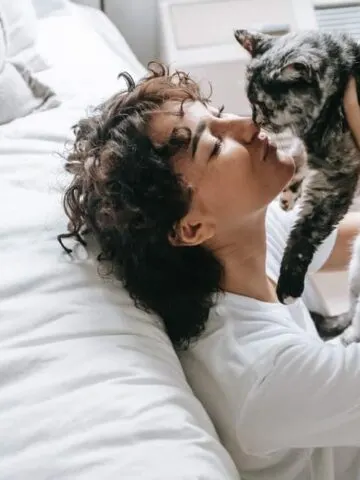If your cat leans in toward your face and sniffs at your mouth and breath, you aren’t alone. Cats are well known for doing this. There are many reasons to explain this behavior.
Cats use their nose and sense of smell as a primary way to explore their world. Their curiosity drives them to investigate all they can about you, their owner.
Cats smell your breath to sense changes in your body, remnants of your last meal, or they’re checking your well-being.
Your cat’s nose is a tool it uses to help it interact with its surroundings. You and your breath factor into those surroundings.
In your cat’s mind, you need to be investigated, and sniffing you is a great way to do that.
What Role Does Scent Play?
An old wives tale believed that cats sniffed your breath because they were trying to steal the breath from human bodies. Of course, we know that isn’t true. But why do cats try to smell your breath?
Cats have about 200 million scent receptors in their nose. In contrast, humans have around 5 million. Because they have so many more scent glands, cats rely more on their noses than any other sense.
There are many reasons for this. They can smell changes in the environment, which helps them explore the world around them. Smell can also help them to find food.
Scent can help them detect changes in members of their community, such as illness. Read on for more about each of these possibilities and others.
Main Reasons Your Cat Smells Your Breath
For cats, using their nose to explore is instinctual. While cats cannot actually see in the dark, their sense of smell helps them identify things that their eyes may miss. This allows them to survive.
Your house cat may not have as many threats to its survival as its wild ancestors did. However, if your pet were to escape, or get in an accident, smelling changes around them would help them survive.
Olfactory nerves allow the cat to smell the scent of other animals on the wind, whether prey or predator. Territorial boundaries are often established through scent marking.
The role of the wind is very similar to your breath. When your cat feels a breeze on their fur, they turn to sniff that breeze.
The act of smelling helps cats determine what they can detect from the surrounding environment.
Your breath feels much like that breeze. The similarity could cause your pet to turn and sniff your breath in the same way.
Smelling The Last Thing You Ate
Cats, like any animal, are food-driven. When they smell the food you ate last on your breath, they want to explore your mouth.
Your cat climbs up closer. They lean in for more sniffs and maybe even try to stick their face in your mouth. They are hopeful that there may still be food in your mouth that they can eat.
Their interest is less in your breath and more in the possibility of shared snacks. Cats will bring food presents, such as mice and birds, to each other.
Your cat could think your food-scented breath is a present for it. Cats are also drawn to the scent of peppermint and mint.
If you have minty-fresh breath from brushing your teeth, they may be trying to find some leaves of those plants inside your mouth for them to nibble on.
Smelling Changes In Your Body
Wild cats are often exposed to illness and the elements. When other members of their community become sick, the smell of their bodies changes.
Their breath can carry smells that indicate sicknesses, such as diabetic ketones, liver failure, and other severe problems. They also may be able to smell bacteria blooms that cause odor.
If you are sick or have health complications, your cat could smell changes on your breath and body. If they show a change in behavior after this, like pawing you, they could be trying to tell you something.
Your cat could also smell something different on your skin. This could easily be explained by changes in shampoo, soap, and even laundry detergent.
Your Cat Smells Your Breath Out Of Curiosity
There is always the possibility that cats want to smell our breath just out of curiosity. Cats have an extremely strong sense of inquisitiveness. It inspired the phrase “Curiosity killed the cat.”
That same sense motivates many behaviors in cats. It is believed that this originated as part of their survival instinct. It may have helped them to survive by sniffing out safe spaces and locating predators.
Instinct is essential to an animal’s survival, and constant use of as many senses as possible increases life span.
While house cats have fewer dangers in their environment, they still possess the instinct to explore. This is because, in the wild, the choice to sniff out a hiding place could literally keep them alive.
Cats, by nature, like to explore and discover changes in their environment. Cats engage in many behaviors that people think are odd.
This one could have no other reason than “I want to sniff that to know more about it.”
Your Breath Is Warm
Cats seek out warm places to curl up. The warmth of the sun in a window or a heat vent blowing warm air is almost magnetic to them.
Our breath is warm as it leaves our body. Your cat could be sniffing your breath because they want to absorb the heat from it.
Does your cat try to, or maybe even like to sleep on your face?
That could also be because they want to curl up where the warm air is constantly blowing out of. In fact, it is easy to see where they could find it similar to an air vent.
This is considered part of the reason that cats want to lie on or beside your face while you sleep. They can smell you, feel your warm breath, and know they and you are safe.
How To Avoid Your Cat Smelling Your Breath
This behavior is not harmful to you or your cat. Some people don’t like for their pets to be so close to their faces.
If you do not want your cat to sniff your breath, gently pick them up, and remove them from close proximity to your face.
They also do not like bananas. The popular recommendation is to rub a banana peel on surfaces you want your cat to avoid in your home.
If this does not work, another option is to give them something else to smell that they like. Some examples are a cat toy with catnip or valerian.
Do not give them a treat immediately after they sniff your breath, though. That reinforces the behavior and encourages them to do it again.
Related Questions
Why does my cat nuzzle me?
In addition to sniffing at your breath and mouth, your cat may rub their head against yours. If you have ever wondered why your cat does this, the answer is pretty simple.
Cats have scent glands on the sides of their face. When your cat rubs this area against you, they are marking you as their territory through their scent.
Have you ever gone to a friend’s house and played with their cat? When you came home, your cat could smell their scent on you.
That welcome home petting session was really your cat erasing any scent but their own.
Why does my cat lick me?
Cats lick for a variety of reasons. Most people assume the action is their attempt to groom or clean you. While this can be true, there are also other reasons.
Cats show affection by licking one another. Mother cats lick their babies to provide care and comfort.
That behavior, as well as kneading their claws, could possibly stem from the association of their mother and happiness. When you make your cat feel content, it tries to tell you by licking.
It is also possible that your cat smells something on your skin that they like. Cats are attracted to all sorts of different scents.
What scents most attract cats?
Cats may be drawn to sniff at things that smell appealing to them. These scents can vary, depending on the animal. However, most cats are interested in aromas that make sense.
The primary scent is anything they could eat, such as meat, tuna, or chicken. You may notice that when you start cooking meat, your cats come into your kitchen.
They are trying to get closer to the smell and potential meal.
The smell of a lot of herbs also entices and appeals to cats. Some of these are things like catnip, valerian, and chamomile. These plant leaves give cats a pleasant feeling of relaxation when they eat them.
One smell that cats do not like is citrus. Things like orange, lemon, and grapefruit will repel them, as will the smell of bananas.
Stacy is a lifelong animal lover who truly believes life just isn’t complete without pets. She’s had pets her whole life (including three dogs and a cat living under the same roof, somewhat harmoniously). She currently resides in NOLA with her husband, son, and two pups, Scooby “Dooby” Doo and Zoey. Stacy always makes a point to learn everything she can about her fur babies, and she has been writing about the pet-parent life for over two years.



Leave a comment
You must be logged in to post a comment.